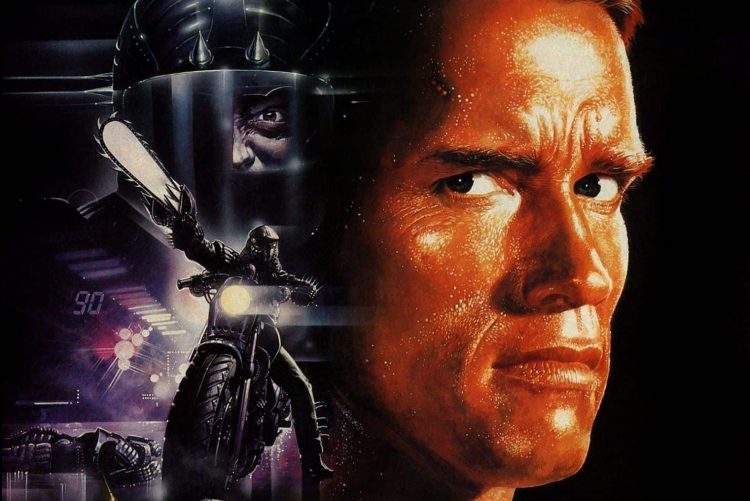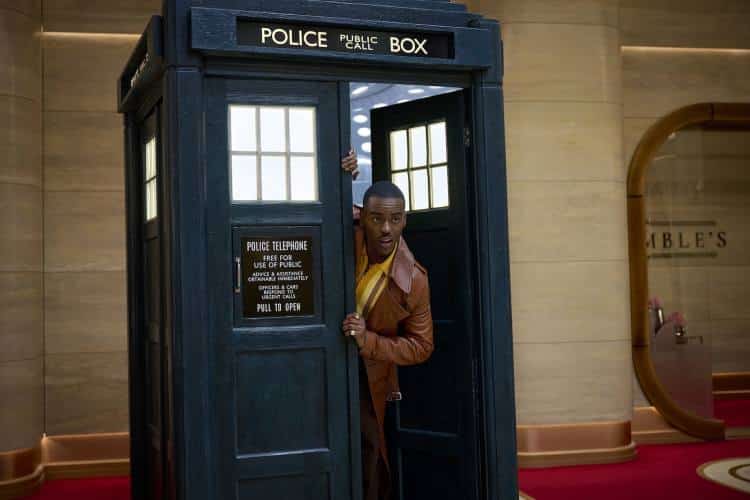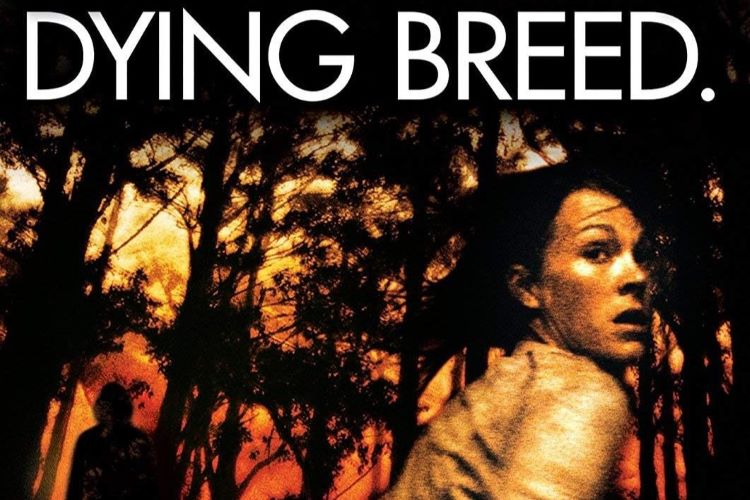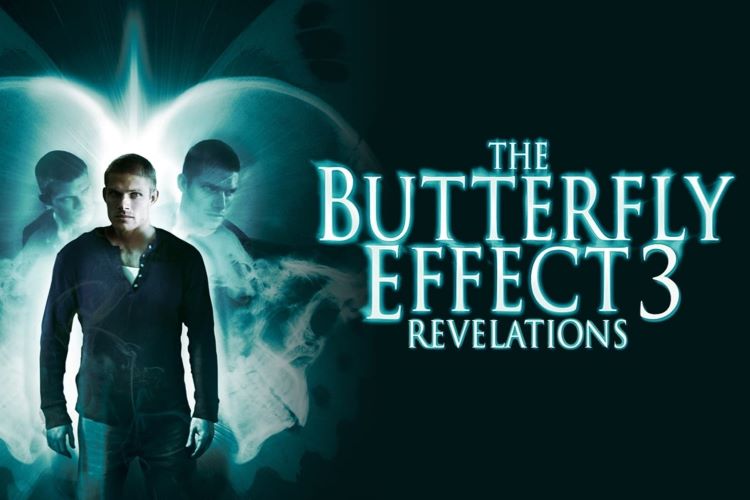“Killian, here’s your Sub-Zero. Now Plain Zero!”
Main Cast: Arnold Schwarzenegger, Richard Dawson
Director: Paul Michael Glaser
Sometimes the best way to adapt a novel is to abandon it almost entirely and write something vaguely similar but not really even close. This was the approach taken when adapting Stephen King’s novel THE RUNNING MAN (which he had published as Richard Bachman) in 1987. Screenwriter Steven de Souza (COMMANDO, DIE HARD) took the idea of the character of Ben Richards (Arnold Schwarzenegger) appearing on a national game show called THE RUNNING MAN and turned it completely on its ear, did away with nearly every aspect of the novel, and turned it into a spectacle of lights, music and pyrotechnics.
In the novel, Ben Richards is trying to make money for an operation for his sick daughter, so he volunteers to appear as a contestant on THE RUNNING MAN, which is more like cross-country Hide and Seek, wherein Ben has to make it from Point A to Point B, all the while everyone in the country has a chance to cash in if they spot and turn him in. Seems simple enough.
Maybe too simple.
So what de Souza did was make Richards a cop who is framed for killing hundreds of unarmed civilians. Richards escapes the prison camp where he’s been detained for 18 months and, along with Laughlin (Yaphet Kotto, ALIEN) and Weiss (Marvin J. McIntyre, PALE RIDER), two other prisoners, makes his way to a resistance camp, established to bring down The Man–in this case ICS, the TV network that basically runs the country, keeping the haves from doing without and keeping the have-nots from getting.
Richards is captured again and forced to participate as a contestant. The runners have three hours to make it out of the 400-block game zone. If they make it, they stand to win a variety of prizes including a trial by jury or even a full pardon. But it’s not that easy, because within the game zone the runners are hunted by stalkers. The stalkers are the heroes of the game, glorified bounty hunters with silly costumes and fancy weapons who have achieved cult status.
But this time they’re not chasing down a scroungy car thief, this is Ben friggin’ Richards, yo, and they better reconize!
It all sounds wonderfully exciting, and back in 1987, being a full-time comic book geek whose biggest concern in life was what would happen to my favorite costumed heroes in the next issue, I ate this movie up.
35 years later I see it for what it really is, a goofy piece of fluff designed more to add another credit to Arnold Schwarzenegger’s resume than it was to adapt another Stephen King novel to film. In fact, as I learned via the director’s commentary, they didn’t even know it was a King novel at the time; everyone was still under the impression Richard Bachman was a different person. So it wasn’t as if they read King’s novel and said, “Yeah that’s good, but we can make it better.” Instead, the way it comes across is they took the novel of a nobody and said, “Yeah, that’s okay, but it’s not for us, but we like the character and the concept, so we’re gonna change it.”
Let’s face facts here, people; the 1980s were known for a few things including very bad fashion, cheesy but catchy pop music, and really bad movies. THE RUNNING MAN is a bad movie.
Paul Michael Glaser’s (Starsky and Hutch) direction is okay for having been brought on after filming had already begun and given two days to get his act together, but he was hobbled almost from the beginning. For one thing, Schwarzenegger had final script approval and anyone who has seen a few of his movies can tell you, dialogue is not the strong suit in most of them. Big guns and muscles, that’s what they’re known for.
Another con was the special effects. Again, I have to go back to it being the 1980s. And the budget on a movie like this couldn’t have been equal to the demands of the script for the real spectacle they were hoping to achieve. The limits of CGI back then were far greater than they would be even five years later, and they weren’t so hot in 1992.
The cheese factor in this movie was ramped up considerably when it came to designing the Stalkers as Ben’s protagonists inside the game. They were cool in 87, but in 2022 the costumes and the fact they each had their own code name . . . I mean, yeah, it’s a comic geek’s wet dream, but it also makes the movie that much harder to take seriously, and that’s coming from someone who has loved every single super hero movie from both the Marvel and DC camps over the last 14 years, even the crappy ones. And the reason they’re hard to like is that terrible 1980s technology.
This was a movie that, concept-wise, was ahead of its time and was too far advanced for the technology of the day to pull off properly. I think if it had been made today instead–I mean originally, NOT a remake–it could have been a blockbuster. It still would have been goofy and full of cheese, but it would be a better movie.
However, as a King adaptation, THE RUNNING MAN isn’t even on the scoreboard. You change the name of the main character and the name of the game show he’s on and you’ve got a movie that officially has zero ties whatsoever to the name Stephen King. But then, the credits don’t list King anywhere, they claim the movie was based on the book by Richard Bachman.
But we know better, and we also know this movie had almost nothing at all to do with the novel as King wrote it. As an adaptation, it gets zero stars, but as a movie in its own right, I think it earns a solid three. It’s fun, but dumb, and sometimes that’s good enough.
King on Film
Word Processor of the Gods (1984)
A Return to Salem’s Lot (1987)
The Shawshank Redemption (1994)
Children of the Corn III: Urban Harvest (1995)
Sometimes They Comes Back … Again (1996)
Children of the Corn IV: The Gathering (1996)
The Revelations of ‘Becka Paulson (1997)
Children of the Corn V: Fields of Terror (1998)

C. Dennis Moore is the author of over 60 published short stories and novellas in the speculative fiction genre. Most recent appearances are in the Dark Highlands 2, What Fears Become, Dead Bait 3 and Dark Highways anthologies. His novels are Revelations, and the Angel Hill stories, The Man in the Window, The Third Floor, and The Flip.






